#if you read these tags.
Text
An Utterly Unsurprising Confession
I am a pedant.
This is partly because I'm autistic, and partly because I was raised and educated by an English teacher. To make matters worse, I was reading the Bible and Shakespeare and so on before I hit double digits. All of this gave me some rather outdated ideas about how English ought to be used.
My entry into the wider world of the internet gave me a terrible grammatical shock. Not only did I have trouble understanding other people, they had trouble understanding me!
I spend a fair amount of time searching Google to learn how to use English the way modern people do.
One night, in the course of this googling, I ran across a Tumblr post.
Now, I don't know who @how-to-write-horror is. They haven't provided any pronouns in their blog header (neither have I; this isn't an uncommon practice), so I'll be referring to them neutrally until I learn their actual pronouns… which I am assuming are most definitely not they/them. "He or she" is so clunky, however, that I refuse to use it.
I could refer to them as it, but that seems rather dehumanizing, don't you think? When I'm fairly certain, based on their opinions about pronouns, that they're either a he or a she?
And yes, I did visit their linked website—it doesn't give their pronouns either.
So "they" it is. Onward!
First they proclaim that "they" is NOT a singular pronoun, and appeal (as proof) to the fact that "they is not singular" sounds absolutely horrific grammatically. They're right, it does.
"You is not singular" sounds equally bad.
This part of their article could easily be rewritten to condemn the singular you, and because that amuses me, I'm going to do it.
The Pronoun "You" is Always Plural.
If "you" were truly singular, it would be interchangeable with the singular pronouns "he/she/it." I can easily prove that to be false. For example:
Peggy is wearing a sweater because she is cold. Let's substitute "she" with "you" to prove that "you" works in this sentence.
Peggy is wearing a sweater because you is cold. "You" and "is" don't work well together. The verb "are" is traditionally used with "you," so let's try something else.
Peggy is wearing a sweater because you are cold. Nope, it still doesn't work. The verbs "is" and "are" don't work together in this sentence. The verb "is" is singular and "are" is plural, so if they're both referring to the same noun, they have to agree with each other.
Peggy are wearing a sweater because you are cold. How many Peggys are there, and how many can wear the same sweater at the same time? Items of clothing are usually designed for single-person use.
Peggy is one person, not a crowd of people. In order for "you" to correctly—in a grammatical sense—refer to a single person named Peggy, the entire English language would have to be restructured.
Strangely, different pronouns work different ways. "You are wearing a sweater because you are cold" works just fine despite the grammatically plural yous and ares and the singular sweater. So does "they are wearing a sweater because they are cold." Baffling!
In their next section, How To Write Horror insists that "they" has not been used as a singular pronoun since the Middle Ages.
To summarize their preliminary arguments:
・In the Middle Ages, people spoke Middle English, not English as we know it today. Even Shakespeare didn't speak modern English, he spoke Early Modern English. The grammar rules of English have changed hugely since the Middle Ages, and so it's patently ridiculous to appeal to tradition in this area: we can't go backwards grammatically (why, I'm not sure).
・Middle English's grammatical rules were inconsistent and depended on location, so you can't appeal to them (a baffling non sequitur: if a rule was the rule at one time, in one place, of course you can point at it and say "see, this was the rule there and then"—and if you like, of course you can go on to say "let's resurrect this one and use it again here and now").
・Most of those old time English speakers were illiterate, which reduced them to using more casual, less grammatically correct English. We modern folk can do better. (Holy superiority complex, Batman. The shortest rebuttal possible: not everyone thinks grammatical excellence is the point of language. Helpful to the point, yes—but not the point itself.)
This, I realized when I finished reading, was a set-up for the astounding move they made at the end of the article.
Next they accidentally explain that while "every person in the room has his own car" is grammatically correct, that does not make "his" a singular pronoun. Since "his" is referring to both singular individuals as well as a group of people, it's plural.
…Or could it be that a sentence which refers to both a plurality (every) and a singularity (person) is correct with either singular or plural pronouns? Hmm.
How To Write Horror's next point involves actual historical examples.
"And whoso fyndeth hym out of swich blame, they wol come up and offre in Goddes name, And I assoille him."
—Geoffrey Chaucer, Canterbury Tales, The Pardoners Tale
Translated to modern English, that's: "And whoever finds themselves guilty of such things, they will come up and offer in God's name, and I will absolve them."
Of course, we could also translate it, "And whoever finds himself guilty of such things, he will come up and offer in God's name, and I will absolve him." That's not really Modern English, though—it uses the neutral "he," which pretty much nobody is used to seeing anymore. Even men today might find themselves wondering, "What about the women?"
(Thus far it's pretty much only enbies who notice their own exclusion, but I gather that's changing.)
What is How To Write Horror's point here? Well, they argue that the original "they" was probably a mistake… and even if it wasn't, since "whoso" is both singular and plural, and the singular "him" is actually a hypothetical singular and therefore plural, the "they" in this sentence refers to a plurality rather than a singularity and is itself plural, Q.E.D.
This doesn't actually change the modern usage of the singular they.
None of their arguments do, if you were waiting for that.
.
"Somebody left their umbrella in the office. Would they please collect it?"
"The patient should be told at the outset how much they will be required to pay."
"But a journalist should not be forced to reveal their sources."
"This is my friend, Jay. I met them at work."
All of these examples from Wikipedia can be rewritten to avoid the singular they. But why should they be? They're not confusing, and not inaccurate by the grammatical rules of modern English in 2024.
(I personally might rewrite 3. I think "but no journalist should be forced to reveal their sources" more accurately expresses the feeling of the sentence—and it's still a perfectly good example of the singular they. You can swap their for his, her, or its without grammatical issue. This is a slightly different subject to the one at hand, though.)
"This is my friend, Jay. I met Jay at work."
Why on earth would you go out of your way to refer to a person like that when there's a perfectly serviceable gender-neutral pronoun available for them and, presumably, they've told you that they like it when you use it for them?
Are you an asshole? That's the only reason to refuse to call a person what they want to be called that I can think of.
Catch me refusing to call Ted "Ted" because his legal name is Theodore and what he likes to be called is technically incorrect. Pedantry forbid I should taint my speech just to make another person feel respected.
My speech isn't even tainted! I'm playing by discarded rules!
.
How To Write Horror lives up to their name in the next section by revealing that they see nonbinary people as egotists (or possibly egoists) who insist on the pronouns that feel right for them because they think they're specialer than everyone else on the planet.
Special People Use Special Words to Illustrate Their Special-ness.
See? I wasn't exaggerating. They list people (and characters) who use/d plural pronouns: Yahweh Elohim, Queen Victoria, anyone of high social status back in the days of Shakespeare.
They mention that "you" used to be solely plural, somehow miss the fact that grammatically it still is, and carry on to argue that people who use they/them pronouns should also employ the Royal We in order to remain grammatically consistent. Given that some people undoubtedly call How To Write Horror "you," perhaps How To should also use the royal we. If you, an individual, are referred to with a plural pronoun, then, grammatically….
Or perhaps they'll start insisting nobody point at them and say "you" anymore. For the sake of the English language.
Next they take a 1759 quote from the Earl of Chesterfield:
"You will say perhaps, one cannot change one's nature; and that if a person is born of a very sensible, gloomy temper, and apt to see things in the worst light, they cannot help it, nor new-make themselves."
They argue that the "a person" in this sentence is a hypothetical person, and therefore actually more than one person.
Let me rewrite the quote and their argument about it.
"He will say perhaps, one cannot change one's nature; and that if a person is born of a very sensible, gloomy temper, and apt to see things in the worst light, you cannot help it, nor new-make yourself."
"You" and "yourself" are used hypothetically in this sentence, making them plural.
The Earl of Chesterfield moved from using directly singular words, "he will" and "one cannot change," to the hypothetical phrase "if a person." "A person" is singular, but it's a hypothetical singular because the determining article "a" is non-specific; "a person" means one person among many and is, therefore, plural.
Using the conditional word "if" supports hypothetical use. Chesterfield is including other people with the same temperament as his son under those who are unable to "new-make yourself." If "you" were a truly singular personal pronoun in this example, Chesterfield could've said something like this about his son:
My son, Philip, you is such a gloomy gus.
The fact that certain pronouns are grammatically plural and so cannot be used with singular grammar even when being used singularly seems to have escaped How To Write Horror.
In fact they declared that "you" was a directly singular word, despite its inescapably plural grammar!
They also decided to use a sentence that sounds weird with a pronoun in it at all. "My son, Philip, he is such a gloomy gus"? Who says that? "My son, Philip, is such a gloomy gus." There you go. Much better. If you really want the pronoun in there, all right—let's shove it in. But keep it grammatical!
Talking about Philip:
・"Oh, Philip, my kid. Yeah, they're such a gloomy gus."
Talking to Philip:
・ "Oh, Philip, my child. You are such a gloomy gus."
Less unnatural and strained uses of the singular they and the singular you, How To Write Horror can look for throughout this post (assuming they take the time to read it). I'm sure they'll find a few!
Next, How To Write Horror hedges their bets with a claim that this letter was written informally, much as emails are written today, and so can't possibly be used to show how people were using the word "they" in the past anyway, even if Chesterfield was using it singularly. Bit of a contradiction, that. Of course it shows how people were using the word "they" in the past. It's a record of past use of the word "they."
I think their assumption is that only the strict grammatical rules of the time apply, where "strict grammatical rules" means "the grammatical rules I personally think count as valid."
Otherwise why would HTWH go out of their way to disparage the grammatical rules of Middle English?
.
They bring up Thackeray's "A person can't help their birth" to claim once again that "a person" is plural (and so, logically, if you write "a person can't help his birth" that makes "his" a plural pronoun too), and move on to try and explain away Shakespeare:
"There's not a man I meet but doth salute me As if I were their well-acquainted friend."
—William Shakespeare, The Comedy of Errors (1594)
A modern English speaker would translate this as, "Everyone I meet greets me like I'm their best friend."
A couple decades ago I might have translated it "there's not a man (meaning a human) I meet who doesn't salute me as if I were his (gender-neutral) well-acquainted friend." What do you suppose How To Write Horror thinks this does to the pronoun "his"?
To substitute:
"There's not a man…" is a hypothetical reference, which is further supported by the hypothetical phrase "if I were." Shakespeare is not saying one man saluted; he's saying that many men saluted individually. One man among many men in plural, making "his" plural.
If Shakespeare were calling out one man then why didn't he say "that man saluted me"? Why would he be vague when talking about a specific person?
Well, they must be right. That's all so very convincing. This must prove that "he" and "him" and "his" are all plural.
Certainly it can't be the case that singular pronouns work just as well, grammatically, in a sentence like this. No. That would be ridiculous, and make this attempt at proving "their" can't be singular a complete waste of time. Surely How To Write Horror wouldn't do that. So "he" must be a plural pronoun!
How odd that it's written with singular grammar.
But there—"you" is written with plural grammar, and yet How To Write Horror insists that this doesn't make it plural. I guess that just happens sometimes.
Pardon the heavy sarcasm: I hope no one's being crushed under it!
They repeat the same argument in a different form (the "he" in each one in his craft is wise is plural, apparently), stumble upon an actual plural they (a group of sacrificial animals in the KJV)… and then, finally, they wrap the whole thing up with the most thorough rejection of possible future evidence that I've seen outside Christian apologia:
If anyone finds a historical example of the singular they which How To Write Horror can't explain away, it's because that historical writer was breaking the rules of English.
Fin.
#Isaiah is pedantic#I like writing long—very long—posts#and this is one of them#Reader#ye be warned.#and no#I'm not going to reveal my pronouns here.#whether I'm they/themmed#he/himmed#she/herred#or dehumanized with it/its#will tell me a fair piece about the people who respond.#ye be warned about that too...#if you read these tags.#that's ''read'' past tense#pronounced like the color red#dontcha love English?#colored text#for which my apologies#the post hurt my brain without it#competing needs are a bitch#if people are actually using the passage from Numbers as an example of the singular they they need to stop#essentially what that verse says is ''you need to do THIS sacrificial ritual as many times as there are animals''#the singular they is not in there#now I'm going to hit post#I'm sure a million typos will smack me in the face later#but don't they always?
4 notes
·
View notes
Text

Is this anything
#always an awkward conversation to have irl#“i love ai.” insert that one spongebob holding out his hands with a shadow above him meme#“FICTIONAL. FICTIONAL AI!!!”#clankerposting#Clay posts#fictional ai#shitpost#hal 9000#robots#p03#electric dreams#allied mastercomputer#ihnmaims#shockwave#transformers#fuck ai#this is an anti ai art blog btw#objectum#saying hello to everyone who reads the tags um... hi!! Really funny to read people recommending me entry level robot/AI media#like yes i have indeed heard of portal and ultrakill. i just didnt pit them in the meme </3#also some guy decided to write in the notes that they were going to crush me into red paste. hot? thank you? ???? weird.
23K notes
·
View notes
Text
When I was a kid, we moved into a house that had a huge lilac tree out front. It was mostly rotten, and it needed to be taken down before it fell. It took a while, but eventually, it was gone.
Mostly. A couple years later, little lilac babies popped out of the ground in its place. My mom was determined to get rid of them, because she'd planted a beautiful flower garden there, and the lilac trees would overshadow and kill the whole garden. I insisted on saving at least a few saplings. She said fine, but I had to dig them out and put them in pots myself.
So, I did. I spent days digging little lilac bushes out of the ground and putting them into pots. Some couldn't be saved, but some could. When all was said and done, I had five brand-new lilac saplings. Seven or eight years old, and it was my absolute pride and joy.
Three died due to sun scorching, severe drought that no amount of watering could save, and perhaps just being moved from their place in the ground. But two survived, and I was awfully proud of them! I'd go out and talk to them every single day. I watered them by hand and made sure they were fertilized properly. I learned all about their favored environments, and I was determined to make sure they lived.
One of my mom's friends saw what I was doing with the lilacs. She asked if she could have one to put in her backyard, and I agreed on the condition that she take very, very good care of it.
It's now fucking enormous. I'm talking ten feet tall and bursting with beautiful purple flowers every spring. My mom still gets updates each year as they start to bloom, which she forwards to me. And all I can think is, "That's my friend! Thriving some twenty years on, there it is."
The other tree nearly died, too. It lived in a pot for far, far too long. I wanted to plant it somewhere in my parents' yard, but my mom was reluctant. Eventually, we agreed to put it in the far back garden. It grew okay for many years, despite the shade, but in all these years, it's never bloomed.
Last year, the massive tree casting massive shadows over the lilac and the garden cracked in half and fell. It tumbled into the garden, crushing part of the nearby shed and destroying a few plants beneath it.
It missed my lilac by inches.
The clean-up is long done. The rest of the tree has been cut down, and my lilac has full sunlight for the first time in fifteen years. It won't bloom this year, I know. But it's got new shoots up. It's taller than ever. I spent half an hour a few weeks ago praising it for surviving all this time, dreaming about its future and telling it how I believe it'll become the tall beauty it's always been meant to be.
I think next year, I'll see flowers.
#aese speaks#a little personal story for you all#the origin of my life-long relationship with lilacs#i've been a garden witch since i was very small! (:#green witch#garden witch#garden magic#the lilac post#hello to everyone reading the og tags on this:#it's a metaphor it's a true story it's real it's fiction it's a poem it's me rambling it's whatever you think it is#30k
33K notes
·
View notes
Text

a couple of eepies
#atsv#spiderman across the spiderverse#across the spiderverse#hobie brown#pavitr prabhakar#chaipunk#people are so fast with all their ship names!#i read them as platonic but tag however you like#art#fan art#atsv fanart#redraw#yeap I draw over that one pic
88K notes
·
View notes
Text
"what's the appeal of drag kings" because women are my favorite guy next question
#do you know this drag artist#drag#drag king#obligatory disclaimer that not all drag kings are women etc etc etc I'm just so happy to have read the tags about#how I'm not the only one who thinks jo calderone is hot
43K notes
·
View notes
Text
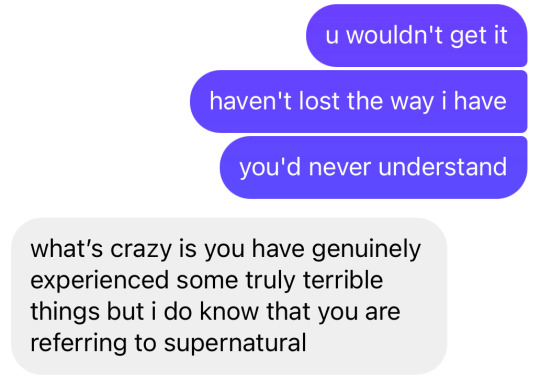
#the context of this exchange is that i was abt to cry on the bus thinking abt bobby nash dying#insane read by my friend row#supernatural#spn#castiel#destiel#<- yeah im tagging it. and you would too.
16K notes
·
View notes
Text
"A story doesn't need a theme in order to be good" I'm only saying this once but a theme isn't some secret coded message an author weaves into a piece so that your English teacher can talk about Death or Family. A theme is a summary of an idea in the work. If the story is "Susan went grocery shopping and saw a weird bird" then it might have themes like 'birds don't belong in grocery stores' or 'nature is interesting and worth paying attention to' or 'small things can be worth hearing about.' Those could be the themes of the work. It doesn't matter if the author intended them or not, because reading is collaborative and the text gets its meaning from the reader (this is what "death of the author" means).
Every work has themes in it, and not just the ones your teachers made you read in high school. Stories that are bad or clearly not intended to have deep messages still have themes. It is inherent in being a story. All stories have themes, even if those themes are shallow, because stories are sentences connected together for the purpose of expressing ideas, and ideas are all that themes are.
#original post#text post#500#1k#2k#btw i know my definition of death of the author is loosey goosey here#it wasn't the main point so i went informal with it! as ppl in the tags have pointed out it isn't exact#and i do recommend reading the wikipedia article or similar (possibly even the essay itself if you're narsty) if you want to learn more!#wasn't expecting this to take off so my apologies to my barthes-heads out there#love you mwah#5k#10k#15k#20k
30K notes
·
View notes
Text
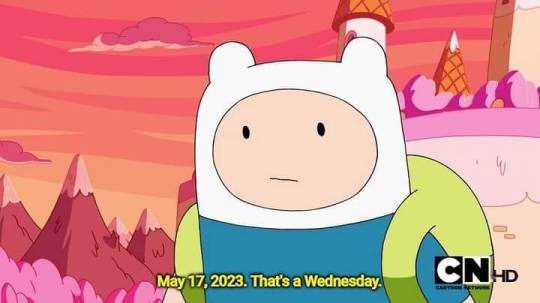
You can only reblog this today.*
*PLEASE READ THE TAGS
#adventure time#finn the human#if you are reading this#please be aware this is a joke#this was a random thing tound on Facebook#and no finn really didn't say that#so go ahead and reblog it#just don't take it seriously#some of the people who reblogged this overreacted#so I feel compelled to add these tags to call them out on it#like seriously#chill out dudes#maybe eat a taco or two#tacos are life#so are burritos#ok this is running its course#david zaslav can suck it#i just felt like adding that because he is a douche
98K notes
·
View notes
Text
I love the idea of all the robins kinda being clones of each other with just a few differences and a concussed Bruce not being able to tell who he’s squinting at so he just says generic statements and avoids saying any names
Bruce (sitting at the breakfast table): so… how’s the weather… dick?
Jason (grinning): you do know I’m gonna hold this against you for like, the next 2 months right
Bruce: (groans into his hands)
Bruce (walking into the living room): hey have you read through the files I gave you yesterday?
Dick: (confused cause he took a day off to surprise Bruce) ?
Bruce: so?
Dick: er… no?
Bruce: Dick?? What are you doing here?
Bruce (walks into the kitchen with a fresh concussion): Jason? I thought you were on a mission with the outlaws?
Tim: (frozen through mid fridge raid, having assumed they were past Bruce calling him Jason since yk. He’s a shit brickhouse now and Tim is, well, obviously not): uh?
Bruce: *turns around and leaves*
Bruce: Oh hey Cass, when did you arrive from Babs’?
Damian: (slowly turns around in the black hoodie he’s wearing) we’re not even the same gender
Bruce: (under his breath) yeah but the same height
#batman#dc comics#dcu#batfam#dc robin#jason todd#batfamily#bruce wayne#dick grayson#nightwing#cassandra cain#batgirl#orphan#red hood#Tim Drake#red Robin#damian wayne#Robin#Bruce Wayne is a good father#but a perpetually confused one#read that tag on a fic once and haven’t forgotten it since#honestly bruce is the embodiment of your mom calling all of your siblings’ names before yours while trying to call for you#the batkids never let him live it down#they actually start calling each other by different names just to confuse him further#he draws the line when he hears dick referring to Jason as Cassandra
9K notes
·
View notes
Text
love when ppl defend the aggressive monetization of the internet with "what, do you just expect it to be free and them not make a profit???" like. yeah that would be really nice actually i would love that:)! thanks for asking
#yes i want things to be free like ??? that is not a weird desire#'but but it costs money to keep up' ok and? how is that my problem#the government has plenty of murder dollars they could reallocate a few to make internet services universal if they wanted#also these companies were perfectly capable of supporting themselves before the internet got drowned with ads so ¯\_(ツ)_/¯#edit: muting notifs on this post bc new additions have kind of petered out#so no one feel bad about adding something someone else has said‚ it is not bothering me im just trying to keep my#notifs page cleanish lol#also since i saw some people are being redirected to read my tags: firstly hiiiiii this is a special secret message for you:3#secondly i have learned since making this that the reason they were able to support themselves previously was because#of investors bankrolling everything#and theyre now finally realizing that theyre never going to actually make a profit and arent as willing to invest#however thats just a minor correction and doesnt change my overall point#once again. so many murder dollars#so thats why im just adding it here in the tags rather than making an actual correction#anyways . love yall 💕#origibberish#bigger gibbers
40K notes
·
View notes
Text

SIGHHHH BSD REREAD…................I MISS THEM SO MUCH :(((
#if i catch anyone tagging this as a ship i will gut you like a fucking fish.#HAPPY MOTHERS DAY TO DAZAI AND DAZAI ONLY. BTW#sorry for the inactivity i was busy flopping my ap’s🥰#no skk art from tumblr user lotus-pear after two weeks of not posting get PRANKED#anyway i was rereading the manga and i was struck once again by how father and son they are 😭😭😭😭😭#dazai calls him “kiddo” and “my boy” in the translation i was reading and it actually made me keel over and sob like he’s so sweet 🥺🥺🥺😭😭#actual crime they haven’t been reunited yet#switched up my coloring style a little bit bc why not#dazai osamu#osamu dazai#nakajima atsushi#atsushi nakajima#bungou stray dogs#bungo stray dogs#bsd#lotus draws
11K notes
·
View notes
Text

(slides u a jon) got time for a draw this in your style?
use #stageturnDTIYS to participate :D
HAVE FUN!!!!! (closeups under the cut :3)

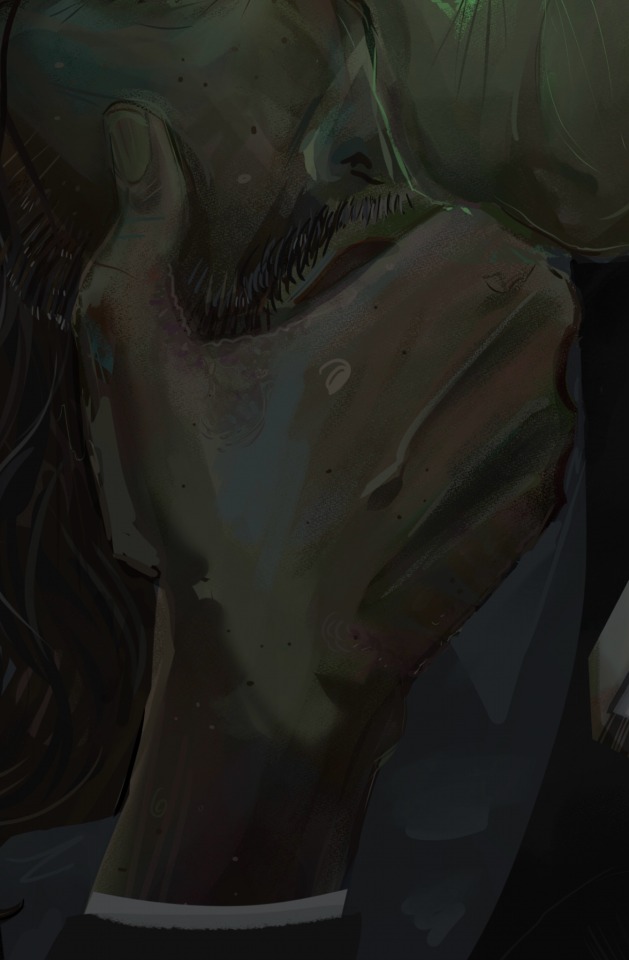

and here's the actual doodle of s1 Jon

#stageturnDTIYS#monarchetype recommended this pose on my last post#everybody say thank u monarchetype#thank u for the kind and silly comments on my last post :) i read and save all of them!!!#hope u have fun and a wonderful day!!! until next i see you#i put a lot of stupid details in this /pos#if youre reading this the tag has morse code on it <3#tma#tma jon#the magnus archives fanart#the magnus archive fanart#the magnus institute#the magnus archives#tma fanart#jonathan sims fanart#jonathan sims#the archivist#dtiys#dtiyschallenge#draw this in your style#tma s4#my art
5K notes
·
View notes
Text
senshi fans: learning how to make nutritious meals for themselves
laios fans: down bad
marcille fans: lesbianism
chilchuck fans: putting that man in situations
#this is what I've observed over the past few weeks#it's great#dungeon meshi#delicious in dungeon#senshi#laois touden#marcille donato#chilchuck#2000+ notes later and I'm starting to think i read y'all to filth#with exception to senshi fans also being down for him#update at 9000 notes: you can like laois for autism reasons and still be down bad#some of y'all in the tags and fics are down bad for laois in mental way#like you want him to be real so you can do brain crazy with him do you understand
21K notes
·
View notes
Text
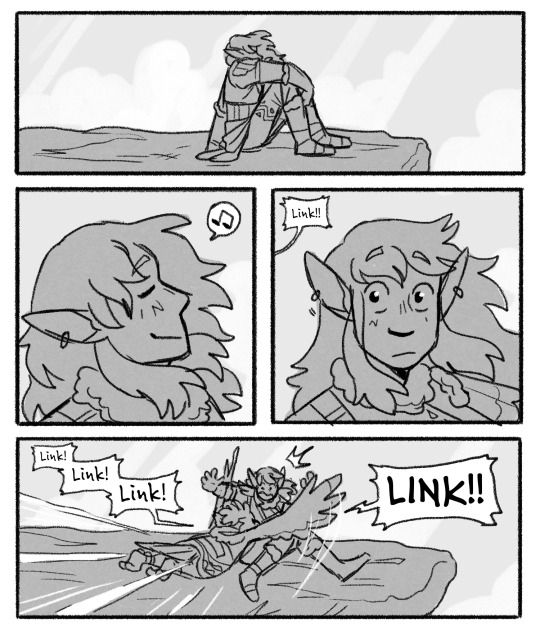

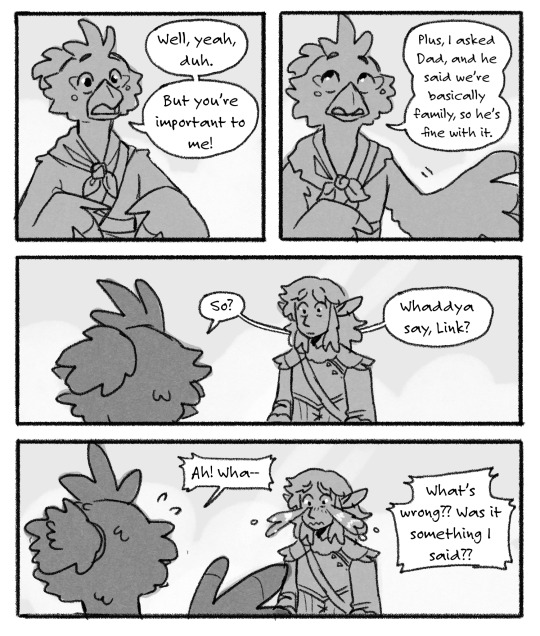
birds of a feather
#totk#loz#link#tulin#totk spoilers#my comics#my art#it is almost 8 in the goddamn morning and my hand is cramping SO bad but if i didnt make this i was going to die#anyways link's signs: page 2 panel 1 he's signing “danger” and page 2 panel 4 he's signing “important/significant”#also idr where i got the “hair braiding is significant to the rito” probably from the reva/ink i used to read back in the day#(censored so it doesnt show up in the tags just in case lol)#theyre everything to me. if you couldn't tell#they have a brother dynamic 2 me but its open to interpretation#idk wtf happened tonight. two long comics from me back to back is absurd#broke this one up also so its more viewable too#sparks art
38K notes
·
View notes
Text
small comp of random and funny twosentencehorror (and 2sentence2horror) posts


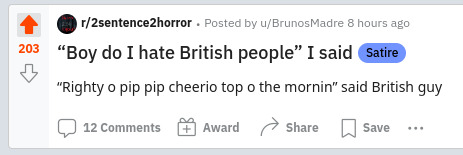
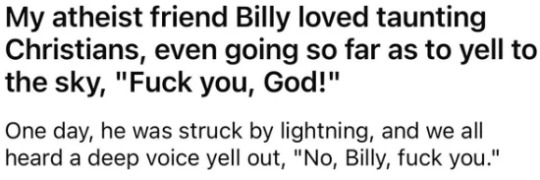
i have others but don't feel like sifting through 500+ files for them right now
#reddit#r/196#two sentence horror#funny#2sentence2horror#meme#why are you reading the tags#stop reading the tags
35K notes
·
View notes
Text
day 1 without ao3: i have gone through all 5 stages of grief multiple times and have invented a 6th. i will not disclose what the 6th stage of grief is.
#I AM GOING INSANE#what am i supposed to do??#’you should work on your WIP’ NO I CANTTT#‘ read actual books on your real bookshelf’ NUH UH#ao3#archive of our own#i’m tagging ships#malec#destiel#hannigram#jonmartin#tomgreg#kenstewy#imagine all the fics i could be reading rn
28K notes
·
View notes